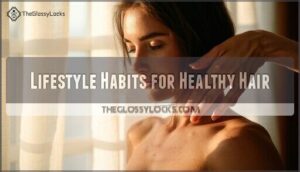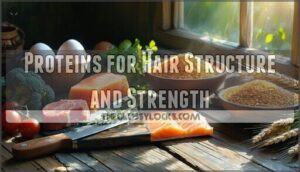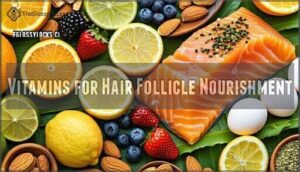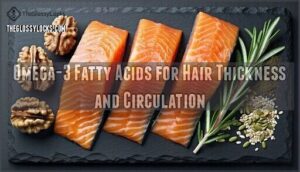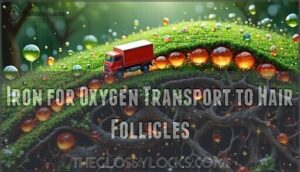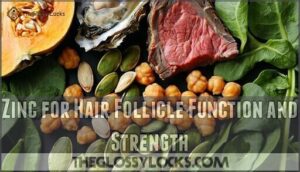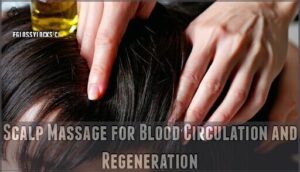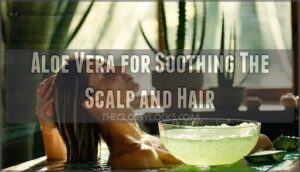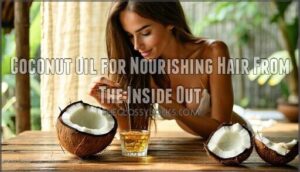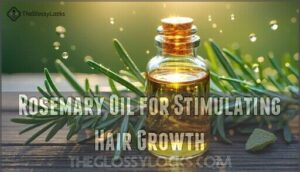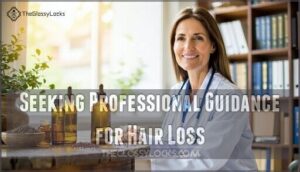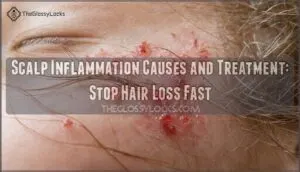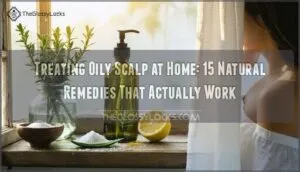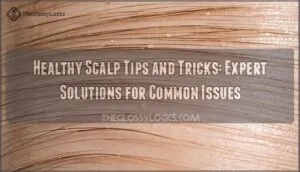This site is supported by our readers. We may earn a commission, at no cost to you, if you purchase through links.
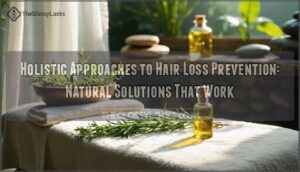 You can reclaim control over your hair’s destiny through holistic approaches to hair loss prevention that address your body’s complete wellness.
You can reclaim control over your hair’s destiny through holistic approaches to hair loss prevention that address your body’s complete wellness.
Start with stress management—chronic stress literally chokes your hair follicles. Regular exercise boosts blood circulation to your scalp, while quality sleep allows hair cells to regenerate properly.
Nourish your hair from within using protein-rich foods, omega-3 fatty acids, and essential vitamins like biotin and vitamin D.
Natural remedies like scalp massages with rosemary oil and gentle treatments with aloe vera can stimulate growth without harsh chemicals.
Your hair reflects your overall health, so treating the root cause beats masking symptoms every time.
Table Of Contents
- Key Takeaways
- Holistic Hair Health Fundamentals
- Lifestyle Habits for Healthy Hair
- Nutritional Powerhouse for Hair Growth
- Natural Remedies for Hair Growth
- Seeking Professional Guidance for Hair Loss
- Frequently Asked Questions (FAQs)
- What causes hair loss?
- What stimulates natural hair growth?
- Can I use natural hair regrowth methods with other treatments?
- What are the best holistic remedies for hair loss?
- What can I do to stop hair loss naturally?
- What is the naturopathic approach to hair loss?
- What are the big 3 to prevent hair loss?
- What are the early signs of hair loss?
- Can hair loss be permanent?
- Does hair loss run in families?
- Conclusion
Key Takeaways
- Manage stress through regular exercise, meditation, and quality sleep – Your hair follicles are extremely sensitive to cortisol levels, and chronic stress can trigger telogen effluvium within 6-12 weeks of major stress events.
- Nourish your hair with essential nutrients like biotin, iron, zinc, and omega-3 fatty acids – These vitamins and minerals support keratin production, oxygen transport to follicles, and overall scalp health when consumed through food or supplements.
- Incorporate natural remedies like scalp massage with rosemary oil and gentle treatments with aloe vera – These methods stimulate blood circulation, reduce inflammation, and create optimal conditions for hair growth without harsh chemicals.
- Treat your overall health to improve hair health – Your hair serves as a biological barometer reflecting what’s happening inside your body, so addressing underlying issues like hormonal imbalances and nutritional deficiencies is more effective than masking symptoms.
Holistic Hair Health Fundamentals
Your hair’s health reflects your body’s overall wellness, making a holistic approach essential for preventing hair loss.
Understanding how nutrition, lifestyle choices, and stress management work together creates the foundation for maintaining thick, healthy hair naturally.
The Hair-Health Connection
Beyond the surface of your scalp lies a complex relationship between your hair and overall health.
Your hair serves as a biological barometer, reflecting what’s happening inside your body.
Your hair whispers secrets about your inner health—listen carefully.
When you’re experiencing excessive hair loss—beyond the normal 50-100 strands daily—it often signals underlying health issues like hypothyroidism, protein deficiency, or hormonal imbalances.
Your hair follicles are surprisingly sensitive to changes in your body’s systems.
They respond quickly to nutritional deficiencies, stress levels, and metabolic shifts, making them early warning signs of systemic problems.
This hair health connection means that achieving natural hair growth requires addressing your body’s needs holistically.
Consider these fundamental aspects of holistic hair care:
- Nutritional foundation: Your follicle health depends on adequate vitamins, minerals, and proteins for proper hair regrowth
- Hormone balance: Fluctuations in hormones like DHT directly impact your scalp health and hair density
- Lifestyle factors: Stress management, sleep quality, and exercise substantially influence hair loss prevention.
Understanding this connection empowers you to take control of your hair’s destiny through thorough scalp care and targeted hair nutrition strategies.
By monitoring your hair health issues, you can identify potential problems early on and address them effectively.
Essential Vitamins and Minerals for Hair Growth
Your hair craves specific nutrients to flourish.
Vitamin E shields follicles from oxidative damage while omega-3 fatty acids boost circulation and thickness.
Biotin strengthens keratin production, preventing breakage.
Iron deficiency starves follicles of oxygen, while zinc repairs hair tissue.
Vitamin D regulates follicle cycling.
These powerhouse nutrients work synergistically—omega rich foods, zinc supplements, and addressing iron deficiency create ideal conditions for robust hair growth.
Iron, Zinc, Vitamin D, and Biotin for Strong Hair
Four key nutrients work together to build strong, healthy hair through their specific roles in cellular function and structure.
Iron delivers oxygen to hair follicles through hemoglobin production, supporting growth and repair. Zinc strengthens individual hair strands while maintaining proper follicle function. Vitamin D regulates hair follicle cycling and supports keratinocyte proliferation. Biotin enhances keratin production, preventing brittle hair and breakage.
Here’s how these nutrients support hair strength:
- Iron prevents hair shedding by maintaining proper oxygen transport to follicles
- Zinc repairs hair tissue and prevents scalp inflammation that damages follicles
- Vitamin D activates hair follicle stem cells for new growth cycles
- Biotin strengthens hair shaft structure through improved protein synthesis
- Nutrient absorption from dietary supplements helps maintain consistent mineral balance for hair thickness
Addressing nutrient deficiencies through targeted supplementation helps restore vitamin role in hair health. Understanding iron deficiency causes is vital for effective hair loss prevention and treatment.
Unhealthy Lifestyle Choices Leading to Hair Loss
Several unhealthy habits can sabotage your hair’s health and trigger significant hair loss.
These lifestyle choices create a domino effect that disrupts your hair’s natural growth cycle and weakens follicles from within.
- Stress Effects: Chronic stress elevates cortisol levels, disrupting hair growth cycles and causing telogen effluvium within 6-12 weeks of major stress events
Looking at the content about stress and hair loss, here’s an engaging blockquote in the same tone:
Your hair whispers your body’s stress secrets before you even realize you’re overwhelmed.
- Poor Diet: Consuming processed foods and sugar imbalances hormones, increases DHT production, and creates inflammation that strangles hair follicles
- Excessive Smoking: Tobacco toxins constrict blood vessels, reducing oxygen and nutrient delivery to your scalp and hair follicles
- Alcohol Abuse: Heavy drinking dehydrates your scalp, interferes with nutrient absorption, and disrupts liver function needed for healthy hair
- Sugar Imbalance: High sugar intake triggers hormonal chaos, increases inflammatory markers, and accelerates DHT production that causes hair thinning
Understanding the impact of scalp health issues is essential to addressing the root causes of hair loss and promoting overall hair well-being.
Lifestyle Habits for Healthy Hair
Your daily habits directly impact your hair’s health just as much as the products you use.
Simple lifestyle changes can strengthen your hair from the inside out, creating the ideal environment for growth and preventing unnecessary loss.
Exercise Regularly for Blood Circulation
Getting your body moving regularly transforms your scalp health by boosting blood circulation to hair follicles. When you establish a consistent exercise routine, you’re basically feeding your hair from within through improved blood flow.
Physical activity doesn’t need to be intense to deliver results. Even moderate cardio health improvements can substantially enhance circulation boost effects. Your scalp responds beautifully to increased oxygen and nutrient delivery that comes with regular movement.
| Exercise Type | Duration | Hair Growth Benefits |
|---|---|---|
| Brisk Walking | 30 minutes | Increases overall blood circulation |
| Yoga | 20-45 minutes | Reduces stress hormones affecting hair |
| Swimming | 25-40 minutes | Improves cardiovascular health and scalp circulation |
| Cycling | 30-60 minutes | Enhances blood flow to extremities including scalp |
| Strength Training | 20-30 minutes | Boosts growth hormone production |
The key lies in consistency rather than intensity. Natural hair remedies work best when combined with regular physical activity that promotes healthy blood circulation throughout your body.
Get Adequate Sleep for Hair Cell Regeneration
Sleep Patterns directly influence hair cell regeneration and scalp health.
Your body repairs hair follicles during deep sleep, making consistent Rest Therapy essential for natural hair loss prevention.
Poor sleep disrupts hair growth cycles, triggering telogen effluvium.
Establish a solid Night Routine with 7-9 hours nightly.
Quality sleep fuels Cell Repair processes that strengthen hair from roots up.
Manage Stress to Prevent Hair Loss
Stress wreaks havoc on your hair’s natural growth cycle, creating a cascade of problems that can leave you with thinning locks.
When cortisol floods your system during stressful periods, it disrupts the delicate balance your hair follicles need to thrive.
This stress-related hair loss often manifests as telogen effluvium, where hair prematurely enters its resting phase.
The mind-body connection plays a vital role here.
Chronic stress and adrenal fatigue create the perfect storm for hair loss, but you can fight back with proven relaxation techniques.
Meditation, yoga, and deep breathing exercises form your defense against cortisol’s damaging effects, restoring your hair’s natural rhythm through effective stress management.
Use Gentle Hair Care to Avoid Damage
While stress management sets the foundation for healthy hair, your daily hair care practices play an equally important role in preventing hair breakage and thinning.
Gentle hair care isn’t just about being nice to your hair—it’s about creating an environment where your strands can thrive.
Your hair styling choices directly impact your hair’s long-term health.
Consider these protective approaches:
- Limit heat styling frequency – Air-dry when possible and use heat protectants when styling tools are necessary
- Choose sulfate-free product ingredients – Harsh chemicals strip natural oils that protect against hair thinning
- Master proper detangling methods – Start from ends, work upward with wide-tooth combs on damp hair
- Adopt protective hairstyles – Loose braids and gentle updos reduce tension on hair follicles
Your washing frequency matters too—over-washing strips protective oils while under-washing can clog follicles.
Incorporate leave-in conditioners for daily hydration.
Most people benefit from washing every 2-3 days, adjusting based on hair type and lifestyle.
Maintain a Healthy Weight for Hair Health
Your body weight acts as a foundation for healthy hair growth. When weight fluctuations occur, they often signal underlying nutritional deficiencies or hormonal imbalances that directly impact your hair’s vitality.
Maintaining a stable weight helps your body absorb nutrients more efficiently. This means iron, zinc, and protein—essential building blocks for strong hair—reach your follicles where they’re needed most. Weight & Hormones work together; dramatic changes can trigger stress responses that disrupt your hair’s growth cycle.
A balanced diet rich in lean proteins, healthy fats, and vitamins supports both weight management and hair health. Regular exercise benefits extend beyond the scale—improved circulation delivers nutrients directly to your scalp while reducing inflammation that can weaken hair follicles.
| Nutrient Focus | Weight Management | Hair Health Impact |
|---|---|---|
| Protein, iron, zinc from lean meats, fish, legumes | Steady weight through balanced portions | Strong follicles, reduced breakage, ideal growth cycles |
Think of healthy weight as your hair’s best friend—it creates the perfect environment for nutrient absorption and hormonal balance.
Nutritional Powerhouse for Hair Growth
Your hair’s health depends heavily on the nutrients you feed it from within.
The right combination of proteins, vitamins, and minerals creates the foundation for strong, vibrant hair that resists thinning and breakage.
Proteins for Hair Structure and Strength
Your hair’s foundation depends on adequate protein intake.
Hair strands consist primarily of keratin, a structural protein that determines hair thickness and density.
Without sufficient dietary sources, your body redirects protein from hair follicles to essential organs, causing hair shaft weakening and increased protein loss.
Here are four key protein considerations for ideal hair health:
- Protein Types: Complete proteins containing all amino acids support thorough protein synthesis
- Dietary Sources: Include lean meats, eggs, fish, and legumes in your daily meals
- Amino Acids: These building blocks repair damaged hair and strengthen existing strands
- Protein Deficiency: Inadequate intake can halt hair growth within weeks, affecting overall hair density
Vitamins for Hair Follicle Nourishment
Your hair follicles need specific vitamins to thrive and prevent hair loss.
Nutrient deficiencies can trigger noticeable follicle health problems within weeks.
| Vitamin | Dietary Sources | Deficiency Symptoms | Supplement Timing |
|---|---|---|---|
| Vitamin C | Citrus fruits, berries | Brittle, slow-growing hair | Morning with food |
| Biotin | Eggs, nuts, seeds | Thinning, breakage | With meals |
| Vitamin D | Fatty fish, fortified foods | Hair shedding, weak strands | With fat-containing meal |
| Vitamin E | Almonds, sunflower seeds | Dull, damaged hair | Evening with dinner |
Vitamin absorption depends on proper nutrition timing and mineral balance.
A Vitamin C supplement can help address deficiencies.
Your body processes these nutrients differently throughout the day, so spacing supplements ideally maximizes follicle health benefits, ensuring optimal hair growth and healthy follicles.
Omega-3 Fatty Acids for Hair Thickness and Circulation
The omega-3 fatty acids act as essential building blocks for stronger, thicker hair.
These powerful nutrients enhance blood circulation to your scalp, delivering necessary nutrients directly to hair follicles.
Fish oil supplements and omega-3 sources like salmon, walnuts, and flaxseeds provide inflammation reduction benefits that support scalp health.
Research shows omega-3 supplements can substantially improve hair density over time.
Discover effective options for omega-3 hair products.
Most experts recommend 1-2 grams daily of combined EPA and DHA for ideal hair thickness results.
Your follicles need consistent omega-3 intake to maintain healthy growth cycles and combat thinning effectively.
Iron for Oxygen Transport to Hair Follicles
While omega-3s nourish your hair from within, iron acts as your hair’s oxygen delivery system.
Without adequate iron, your follicles can’t breathe properly, leading to weakened growth and potential hair loss.
Your red blood cells depend on iron to transport oxygen throughout your body, including to your hair follicles.
These follicles are among the most rapidly dividing cells in your body, making them incredibly sensitive to iron deficiency.
When iron levels drop, your body prioritizes essential organs over hair growth, leaving your follicles starved for oxygen.
Here’s what you need to know about iron and hair health:
- Iron Deficiency affects up to 50% of women with diffuse hair loss
- Ferritin Levels below 30-40 ng/dL increase hair loss risk substantially
- Oxygen Delivery to follicles becomes compromised without adequate iron stores
- Hair Follicle Health depends on iron-rich blood flow for peak function
- Iron Supplementation can reverse hair loss when deficiency is corrected
Boost your intake with iron-rich vegetables like spinach and broccoli, paired with vitamin C for better absorption.
Zinc for Hair Follicle Function and Strength
Essential zinc fuels your hair’s foundation, supporting follicle function and preventing breakage. Zinc deficiency triggers hair loss, making adequate intake vital for strong strands. Your body needs proper zinc absorption to maximize benefits.
| Zinc Sources | Daily Benefits |
|---|---|
| Oysters (6 medium) | Supports keratin production |
| Pumpkin seeds (1 oz) | Strengthens hair shaft |
| Chickpeas (1 cup) | Promotes follicle health |
| Beef (3 oz) | Enhances protein synthesis |
| Spinach (1 cup cooked) | Boosts cellular repair |
Zinc dosage matters—adults need 8-11mg daily. This mineral orchestrates protein synthesis, creating the building blocks your hair craves. Without sufficient zinc, follicles weaken and hair thins noticeably.
Natural Remedies for Hair Growth
While conventional treatments often come with unwanted side effects, nature offers powerful alternatives that can stimulate hair growth from the comfort of your home.
These time-tested remedies work by improving blood circulation, nourishing your scalp, and providing essential nutrients that support healthy hair follicles.
They can be used to improve the overall health of your hair, making it stronger and more resilient, by nourishing your scalp.
Scalp Massage for Blood Circulation and Regeneration
While nutrition builds hair from within, external stimulation through scalp massage techniques can release your hair’s growth potential. This time-tested method doesn’t require expensive treatments or harsh chemicals—just your fingertips and consistency.
Blood circulation boost: Massage techniques increase blood flow to hair follicles, delivering essential nutrients for hair follicle stimulation and healthy scalp health.
Encouraging hair regeneration methods: Massaging stretches dermal papilla cells responsible for hair growth, promoting natural regeneration processes.
Stress relief: Regular massage reduces tension, addressing stress-related hair loss while promoting relaxation.
A 2019 study showed daily 4-minute scalp massages for 24 weeks improved hair growth and blood circulation substantially.
Use your fingertips to massage in small circles with light to medium pressure. Focus on pressure points across your entire scalp. Oil infusion with rosemary or coconut oil can enhance benefits. Massage frequency should be daily for optimal results, though scalp exfoliation should occur weekly to remove buildup and improve circulation.
- You’re literally massaging life back into dormant follicles
- Each circular motion brings hope for thicker, stronger hair
- Your consistent touch becomes your hair’s daily vitamin
Aloe Vera for Soothing The Scalp and Hair
Nature’s gentle healer brings relief to your troubled scalp.
Aloe vera soothes inflammation while delivering deep hydration to damaged hair follicles.
This natural remedy fights dandruff and creates ideal conditions for healthy growth.
Apply pure aloe vera gel directly to your scalp several times weekly, or choose shampoos containing this powerful plant extract for consistent scalp health maintenance.
Coconut Oil for Nourishing Hair From The Inside Out
Coconut oil benefits your hair by reducing protein loss and enriching your scalp’s microbiome.
Research shows this natural powerhouse strengthens strands while promoting scalp health.
Apply coconut oil before or after washing, depending on your hair type. For dry hair, use it as a leave-in treatment.
Many find coconut oil benefits their hair health. This holistic hair health approach delivers deep nourishment your locks crave, with coconut oil being a key component.
Rosemary Oil for Stimulating Hair Growth
While coconut oil provides deep nourishment, rosemary oil offers powerful hair growth stimulation through improved circulation.
Scientific Evidence shows rosemary oil matches minoxidil’s effectiveness in treating androgenic alopecia without causing scalp irritation.
The Rosemary Benefits include enhanced blood flow to follicles and reduced inflammation.
For Application Methods, dilute rosemary oil with a carrier oil like jojoba to prevent irritation.
DIY Recipes can include mixing 3-4 drops with coconut oil for daily scalp massage.
This holistic approach supports natural hair growth strategies and hair loss prevention.
Potential Side-Effects remain minimal when properly diluted, making it safer than conventional treatments.
Onion Juice for Promoting Hair Growth
While rosemary oil awakens dormant follicles, onion juice takes a different approach to hair growth promotion. This kitchen staple packs powerful sulfur benefits that strengthen your hair from the roots up.
Research shows impressive results for alopecia areata treatment. In one study, 86.9% of patients experienced regrowth after six weeks of twice-daily onion juice application, compared to just 13% using placebo. The sulfur compounds boost keratinocyte growth and collagen production, creating stronger hair strands.
Application methods are straightforward. Extract fresh onion juice and massage it directly onto your scalp, or mix it with honey or coconut oil to reduce the pungent smell. Leave for 30-60 minutes before rinsing.
Onion juice delivers multiple benefits through circulation improvement:
- Reduces hair fall and promotes new growth
- Prevents premature graying naturally
- Improves overall scalp health conditions
- Eliminates dandruff with antimicrobial properties
- Strengthens follicles for fuller-looking hair
These natural remedies work best with consistent use, making hair loss prevention methods more accessible than expensive treatments.
Fish Oil for Improving Hair Density and Diameter
Fish oil supplements pack a powerful punch for your hair’s health. These omega-3 fatty acids boost hair density and diameter while reducing scalp inflammation.
Studies show omega-3 benefits include improved hair follicle health and enhanced scalp circulation. You’ll typically need 1-3 grams daily, though dosage guidelines vary.
Your hair thickness transforms as these nutrients nourish follicles from within. Consider also rosemary essential oils for stimulating hair growth.
Seeking Professional Guidance for Hair Loss
While natural remedies can substantially improve hair health, you shouldn’t hesitate to seek professional guidance when hair loss becomes concerning or persistent.
A dermatologist or trichologist can identify underlying causes and create a personalized treatment plan that combines the best of conventional medicine with holistic approaches.
Consult a Dermatologist or Trichologist for Personalized Advice
While natural remedies offer promising results, sometimes you need professional backup to crack the code on stubborn hair loss.
Think of it like having a personal detective for your scalp—dermatologists and trichologists bring the expertise you can’t Google your way to.
These specialists offer thorough solutions that go beyond surface-level treatments:
- Expert Hair Analysis reveals hidden causes through advanced diagnostic tools that examine follicle health, scalp condition, and hair density patterns
- Personalized Treatment Plans target your specific type of hair loss, whether it’s androgenic alopecia, telogen effluvium, or scalp inflammation
- Scalp Condition Diagnosis identifies underlying issues like seborrheic dermatitis, fungal infections, or autoimmune conditions affecting hair growth
- Advanced Hair Therapies include prescription medications, platelet-rich plasma treatments, and cutting-edge procedures unavailable over-the-counter
Early Intervention Benefits can’t be overstated—catching hair loss early dramatically improves treatment outcomes.
Your healthcare provider will conduct a thorough Hair Loss Diagnosis, examining your medical history, lifestyle factors, and family genetics to create a targeted approach that actually works for your unique situation.
Medication and Hair Transplantation for Hair Loss Treatment
When holistic approaches reach their limits, medical intervention becomes your next line of defense.
Prescription medications like finasteride effectively block DHT production, with 83% of men experiencing no further hair loss after two years.
However, Minoxidil Side Effects include contact dermatitis and initial shedding, while some seek Finasteride Alternatives due to potential sexual side effects.
Hair transplantation offers permanent solutions through two primary surgical procedures.
FUT vs FUE represents different approaches—FUT removes a strip of scalp while FUE extracts individual follicles.
Modern techniques achieve 90-95% graft survival rates, though Hair Transplant Cost varies substantially by clinic and extent of treatment.
Medication Effectiveness
Oral finasteride prevents further loss in most users, while topical minoxidil increases hair count by 14-18% after one year of consistent use.
Hair Transplant Types
Both FUT and FUE permanently relocate healthy follicles to thinning areas, requiring careful consideration of recovery time and long-term maintenance needs.
Supplements for Addressing Nutrient Deficiencies
Beyond medical treatments, targeted hair growth supplements can fill nutritional gaps that contribute to thinning hair.
Biotin supplements show strong biotin effectiveness for strengthening hair structure, while iron absorption improves with vitamin C pairing.
Zinc benefits include supporting follicle function—aim for 8-11mg daily. Vitamin D dosage should be professionally determined, as deficiency affects hair cycles.
Omega-3 sources like fish oil capsules enhance scalp health. Quality hair loss vitamins address multiple nutrient deficiencies simultaneously.
However, vitamins aren’t magic bullets—they work best when underlying deficiencies exist, making professional testing your smartest first step.
Maintaining Open Communication With Your Healthcare Provider
Open, honest communication with your healthcare provider forms the foundation of effective hair loss management.
Share your specific concerns and goals openly – your doctor can’t read your mind, but they can read the signs when you’re transparent about symptoms and expectations.
Key communication strategies:
- Symptom Tracking – Document hair loss patterns, timing, and triggers
- Treatment Options – Discuss all available therapies, including natural approaches
- Realistic Expectations – Understand timeframes and potential outcomes together
- Shared Decision-Making – Collaborate on treatment plans that fit your lifestyle
Regular follow-up care guarantees your treatment stays on track and adapts to your changing needs.
If stress is a factor, be sure to discuss potential telogen effluvium causes with your doctor.
Frequently Asked Questions (FAQs)
What causes hair loss?
Like a garden losing its bloom, your hair’s foundation weakens through genetic predisposition, hormonal fluctuations, nutritional deficiencies, chronic stress, medications, and underlying medical conditions disrupting natural growth cycles.
What stimulates natural hair growth?
You’ll boost natural hair growth through scalp massages, essential oils like rosemary and peppermint, protein-rich foods, biotin supplements, and stress management techniques that improve circulation and follicle health.
Can I use natural hair regrowth methods with other treatments?
Yes, you can safely combine natural hair regrowth methods with conventional treatments.
Natural approaches like scalp massage, biotin supplements, and rosemary oil complement medications like minoxidil without interference.
Always consult your doctor first.
What are the best holistic remedies for hair loss?
You’ll find success combining scalp massage, rosemary oil, saw palmetto, biotin supplements, stress management, and nutrient-rich foods like salmon and leafy greens for thorough hair restoration.
What can I do to stop hair loss naturally?
Strike while the iron’s hot to naturally combat hair loss through targeted nutrition and lifestyle changes.
Consume omega-3 fatty acids, biotin, iron, and zinc while managing stress through meditation, exercise, and adequate sleep to strengthen follicles.
This can be achieved by making sure to manage stress through meditation, exercise, and adequate sleep.
What is the naturopathic approach to hair loss?
Naturopathic doctors target hair loss‘s root causes through nutrient testing, hormone balancing, stress management, and natural remedies like saw palmetto, rosemary oil, and scalp massage techniques.
What are the big 3 to prevent hair loss?
Over 40% of stressed individuals experience noticeable hair loss, making prevention essential.
You’ll need three key strategies: manage stress through meditation and exercise, maintain proper nutrition with biotin and iron, and use gentle hair care practices avoiding excessive heat styling to achieve proper nutrition and hair care.
What are the early signs of hair loss?
You’ll notice increased hair in your shower drain, on your pillow, or brush. Your hairline may recede slightly, and your part might appear wider than usual.
Can hair loss be permanent?
Yes, hair loss can be permanent depending on its cause.
Androgenic alopecia (male/female pattern baldness) typically causes permanent follicle miniaturization.
However, stress-related, nutritional, or hormonal hair loss is often reversible with proper treatment, which can lead to a significant improvement in hair loss conditions.
Does hair loss run in families?
Hair loss absolutely runs in families. You’re dealing with genetics here—male-pattern and female-pattern baldness are hereditary conditions passed down through family lines, affecting your hair’s destiny from birth.
Conclusion
Your hair journey mirrors a garden—when you nurture the roots, vibrant growth follows naturally.
These holistic approaches to hair loss prevention work by addressing your body’s complete wellness rather than targeting isolated symptoms.
You’ve learned that stress management, proper nutrition, and natural remedies create the foundation for healthy hair growth.
Remember, consistency matters more than perfection.
Start with one or two changes and build from there.
Your hair reflects your overall health, so treating yourself well means treating your hair well too.

